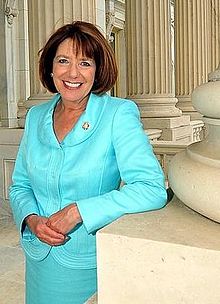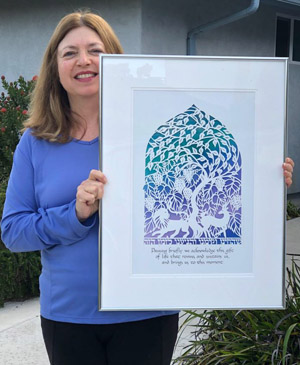
Other items in today’s column include:
*Jewish community coronavirus news
*Political bytes
* San Diego County Judaica
*In memoriam


SAN DIEGO –Right now, Congress should focus on getting help to people who need it amid this coronavirus pandemic, but later on it should investigate why the United States was slow to respond to the threat of coronavirus and why necessary medical equipment was in such short supply, Congresswoman Susan Davis, D-San Diego, said Tuesday during a telephonic town hall meeting.
Davis, who will retire from Congress at the end of her current tenth term, took 12 questions from constituents who were identified only by first name during the hour and ten minute telephonic meeting. Most requests for more information dealt with the recently passed federal CARES Act which provides financial relief to individuals and companies throughout the nation, although some questioners sought answers to issues that are dealt with by state and local government, rather than the federal government.
A caller named Laura wanted to know if there were provisions to help people who are self-employed; Oscar asked what people should do if their unemployment insurance already has run out; Linda wanted advice for seniors on fixed incomes who haven’t had to pay taxes in years. Are they still eligible for relief? Juliet questioned if renters will be protected from immediate eviction once the moratorium is lifted; Henry said he was disabled, has used up his food stamps, so how can he get groceries? Yasmin said she had twins earlier this year, and asked if financial relief would come for them, given that they were not listed on her 2019 tax returns.
The congresswoman said she understands that federal guidance on these and similar issues is expected within a day or two. She also took note of questioners’ phone numbers and said in some cases, her office would try to get back to them with precise answers. She suggested to Henry, who needs food, that he call the telephone number 211 for assistance.
Some non-financial questions also were asked. For example, Beverly expressed concern about the dietary needs of health care workers. Are they getting enough to eat? Are they getting proper food? Diane wondered if the need for social distancing and self-protection is really understood by constituents? Jennifer queried whether there would be a set date for all school years to come to an end. Henry asked if there will be mail ballots available for the presidential election, and why it has taken so long for the National Defense Production Act to be invoked? Lauren asked if immigration court proceedings should be halted in light of the potential threat to the health of judges, plaintiffs and defendants.
Taken as a whole, the questions indicated that there is still a lot of confusion among the public about what to do in these unprecedented times.
Davis, who conducted the town hall from her home in San Diego, asked those on the phone call — whom she said numbered in the thousands — to answer by pressing a button on their telephones whether they believed the State of California had acted correctly in closing down everything but essential services. About 86 percent of the respondents thought California did the right thing. Asked whether the planned federal tax rebate will be helpful to them, 52 percent said yes, 28 percent said no, and 20 percent were not sure. Asked how they were receiving their information about the corona virus 43 percent said television, 34 percent said the Internet, and the balance indicated they received it from social media, friends, or other sources.
*
Jewish community coronavirus news
*San Diego City Councilwoman Barbara Bry has been issuing from her office a daily compendium of pandemic developments as they affect our local region. For example, she broke down the number of people in San Diego County who have been infected by coronavirus by age group as of 5 p.m. March 30. They were: 0-9 years: 4 cases ; 10-19 years: 6 cases; 20-29 years: 121 cases; 30-39 years: 148 cases; 40-49 years: 105 cases; 50-59 years: 91 cases; 60-69 years: 52 cases; 70-79 years: 45 cases; 80+ years: 29 cases; Age unknown: 2; Hospitalized Cases: 118; Intensive Care Cases: 51; Deaths: 7. Bry also reported that “The San Diego Housing Commission created a page on its website to provide information for residents and small businesses on how to avoid eviction through the City’s temporary eviction moratorium.”
*Rabbi Moishe Leider of Chabad of University City has been sharing his thoughts on videos during this time of pandemic. In a recent video, he said that it doesn’t matter where one lives because “if you are going to be happy, you’ll be happy anywhere.” What matters, he counseled, is not what’s going on outside, but rather what is happening inside of us. He noted that the most important place in Judaism is the home.
*San Diego County law enforcement officers and prosecutors say that in addition to price gouging and consumer fraud, officials are on the watch and are ready to prosecute instances of hate crimes during the coronavirus pandemic. An advisory from District Attorney Summer Stephan said: “To report a hate crime, contact the San Diego Police Department at 619-531-2000 or 858-484-3154 or the San Diego County Sheriff’s Department at (858) 565-5200. For emergencies, call 9-1-1.”
*
Political bytes
U.S. Rep. Scott Peters, D-San Diego, on Tuesday denounced a Trump Administration decision to alter fuel efficiency standards put into place by the Obama Administration to reduce air pollution from cars and the emission of greenhouse gasses. “At a time when the need to listen to scientists and public health experts has become more critical and obvious than ever, it is unconscionable that this Administration would ignore the enormous body of climate research and choose to unleash toxins that will destroy our planet and hurt people with respiratory illnesses who are especially vulnerable to the COVID-19 virus. President Trump’s decision to rollback these standards drastically hurts the health of our communities, children and our planet, and it further weakens the United States’ global leadership on climate,” Peters said.
*
San Diego County Judaica



Our community Judaica photo collection continues to grow. Above, Israeli-born Shuli Hanover displays the Bible upon which she took her oath when she was inducted into the Israel Defense Forces. At left, Glenda Sacks Jaffe, Hillel director at the University of San Diego, shows a paper cut by Shendl Diamond that she purchased at auction at an event sponsored by the Jewish Federation of San Diego. The Hebrew inscription at the bottom of the papercut is the Shehekiyanu prayer, thanking God for allowing us to reach the present moment. Jaffe says she has it hanging in a front hallway of her home and that it gives her joy. Some readers will remember that Diamond’s elaborate paper cuts often were featured on the front page of the now defunct San Diego Jewish Times. At right, Kate Schwartz, a candidate in the 75th Assembly District runoff on Nov. 3rd, examines her chanukiah, which she purchased during a visit to the Spanish Village arts and crafts studios in Balboa Park.
*
In Memoriam
Chabad of University City has reported the death in New York from coronavirus of Nasser Khorshidi, brother of Helen Khorshidi of San Diego.
*
Donald H. Harrison is editor of San Diego Jewish World. He may be contacted via donald.harrison@sdjewishworld.com Obituaries in San Diego Jewish World are sponsored by Inland Industries Group LP in memory of long-time San Diego Jewish community leader Marie (Mrs. Gabriel) Berg.